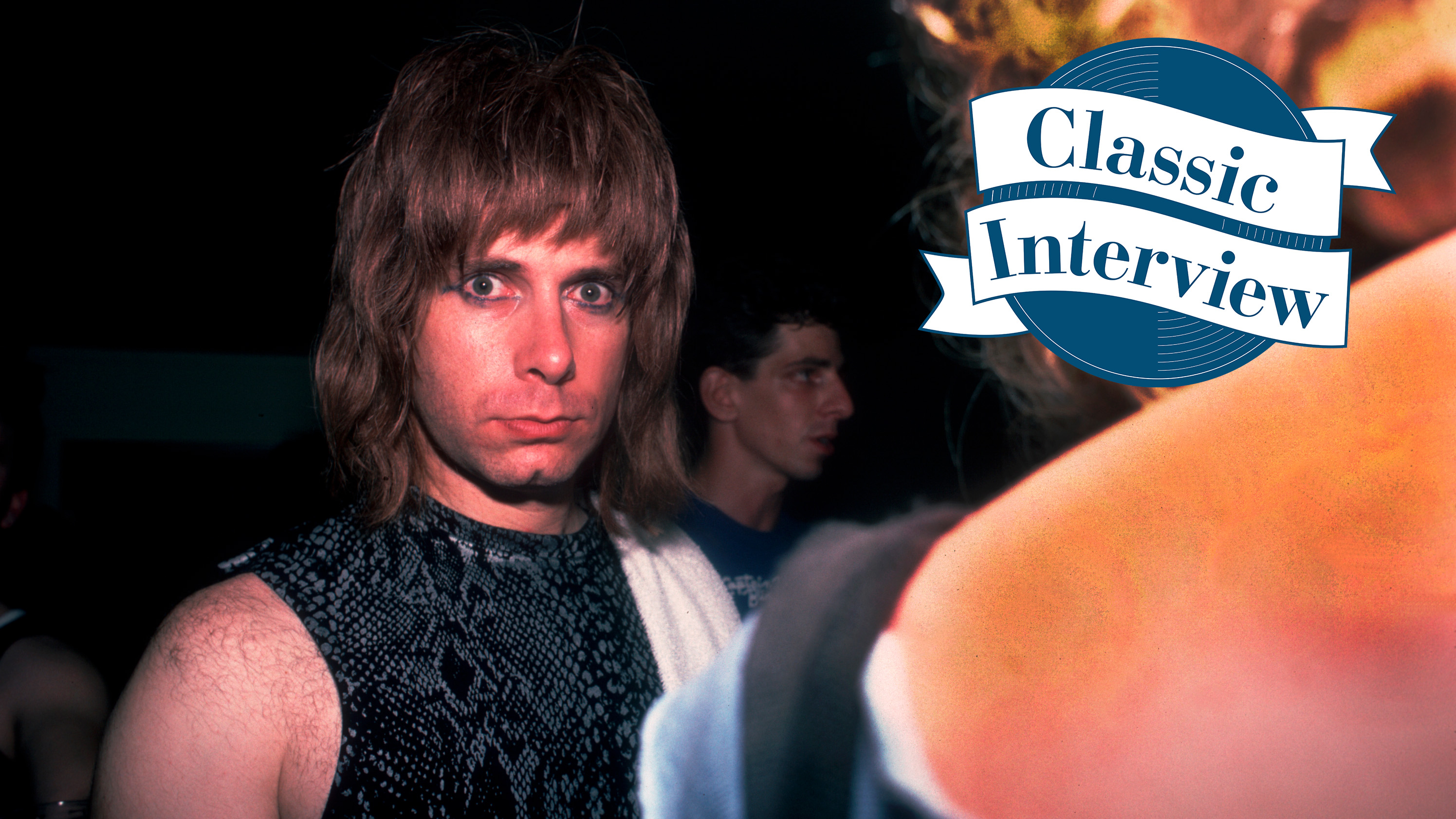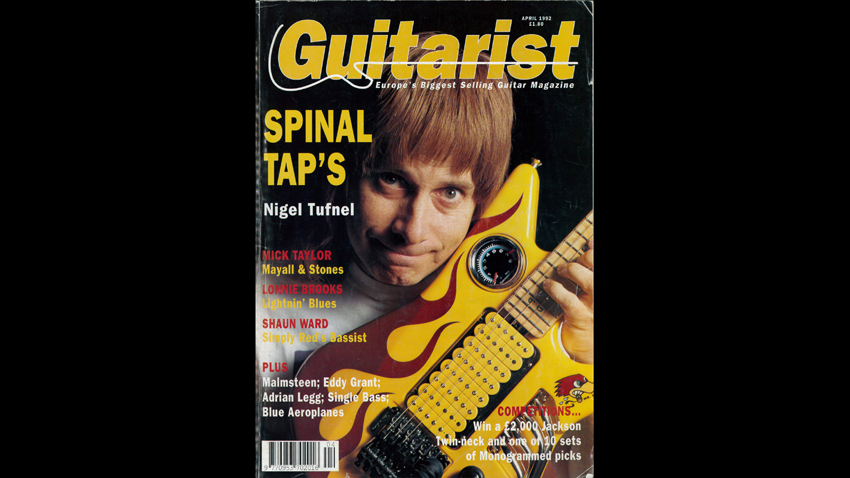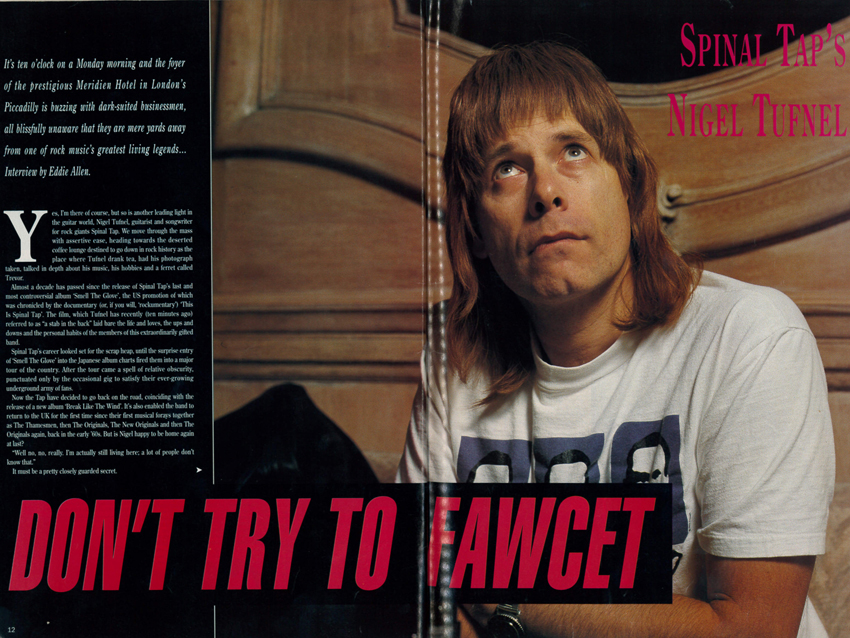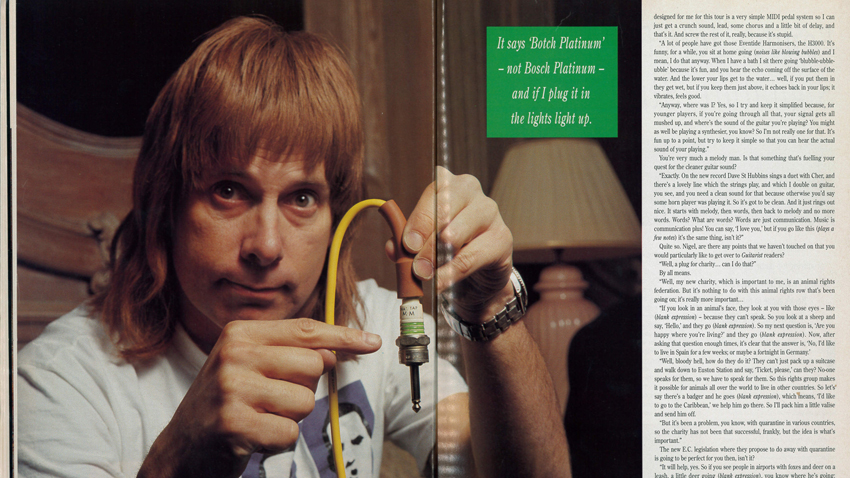"My newest invention is an amp capo. It's being manufactured as we speak" – Classic interview: Spinal Tap's Nigel Tufnel
"You can play as fast as you like and learn all your tapping and all that, but if you can't sing a song to me through your instrument then go home"

The following interview was first published in Guitarist magazine in April 1992.
It's ten o'clock on a Monday morning and the foyer of the prestigious Meridien Hotel in London's Piccadilly is buzzing with dark-suited businessmen, all blissfully unaware that they are mere yards away from one of rock music's greatest living legends…
Yes, I'm there of course, but so is another leading light in the guitar world. Nigel Tufnel, guitarist and songwriter for rock giants Spinal Tap. We move through the mass with assertive ease, heading towards the deserted coffee lounge destined to go down in rock history as the place where Tufnel drank tea, had his photograph taken, talked in depth about his music, his hobbies and a ferret called Trevor.
Almost a decade has passed since the release of Spinal Tap's last and most controversial album Smell The Glove, the US promotion of which was chronicled by the documentary (or, if you will, 'rockumentary') This Is Spinal Tap. The film which Tufnel has recently (ten minutes ago) referred to as "a stab in the back" laid bare the life and loves, the ups and downs and the personal habits of the members of this extraordinarily gifted band.
Spinal Tap's career looked set for the scrap heap, until the surprise entry of Smell The Glove into the Japanese album charts fired them into a major tour of the country. After the tour came a spell of relative obscurity, punctuated only by the occasional gig to satisfy their ever-growing underground army of fans.
Now the Tap have decided to go back on the road, coinciding with the release of a new album Break Like The Wind. It's also enabled the band to return to the UK for the first time since their first musical forays together as The Thamesmen, The Originals, The New Originals and then The Originals again, back in the early '60s. But is Nigel happy to be home again at last?
"Well no, not really. I'm actually still living here; a lot of people don't know that."
Get the MusicRadar Newsletter
Want all the hottest music and gear news, reviews, deals, features and more, direct to your inbox? Sign up here.
It must be a pretty closely guarded secret.

I was out in the shed and I came up with a great idea, which I'm trying to get manufactured, which is a folding wine glass
"Yes, and I'd appreciate it if you'd keep it guarded. What's happening is, basically, I've had a flat off the King's Road since about the late '60s - Glebe Place, in fact - and I've got a place near Tunbridge Wells. I can't say much more than that because it's where I do my serious work, but I come into town to stay at the Glebe Place flat, just to eat, basically, and meet people. But the town of… well, I can say it I suppose… the town of Brinsby, which is where I've got my sort of country estate, is where I do my inventing."
What have you invented recently?
"My newest invention is an amp capo. It's being manufactured as we speak, and it's about this big by this big, (makes a few fisherman's gestures) and I strap it around the Marshall stacks which are about this wide (more fisherman gestures) and it goes around the bottom. What it does is, if you can only play in A it squeezes, sonically, the cones to shape the sound, pushing it up higher, lifting it. So you make a mark on the side of the speaker, say A, G, et cetera, and get the roadie to push it up."
This could prove as revolutionary as Nigel's idea to have his Marshalls modified to go to eleven. After that stroke of brilliance was revealed in the documentary several amp manufacturers took up the idea.
"I know. Well this is a new thing. And I've got a new musical notation system as well, if we can talk about that…"
Yes of course.
"Simple, this is how it works… If you're reading a chord chart and it says A, B, C, et cetera, with my system it would say, One for A, Two for B… But you're a guitarist - see if you can figure this out… One, Two, One
- what would those chords be?"
And you're calling One A?
"Yeah, One is A, B is Two. So what would One, Two, One be?"
That would be A,B,A.
"Right. Let's try another one… What would this be - One, Three, Two?"
A,C,B.
"You've got it already. Now, if there's a small dot above the One, it's A sharp. If it was on the bottom, it would be…?"
A flat..?
"Right. So people who don't know music could read it, you see?"
That's a terrific idea. Does it blow tab away as well? It's certainly simpler to understand.
"Well it blows it away for me because I can't read tab, you see?"
So, since the last album is this what you've been spending your time doing?
"Well yes…that and the other invention, out in the shed. Back in the shed I've got a couple of ferrets; they keep me company. So I've got women at night and ferrets in the day; that's basically the real way to do it."
Aren't you worried about getting them mixed up?
"Which happened last week, with Trevor, my favourite ferret. It was rather embarrassing, actually - I can be accused of being weird, but not that weird! So I said 'Excuse me Trevor, you've got to go back to the cage now. This has gone too far.' We'd already had champagne and were watching the telly, and he just lies back in the bed like this (Tufnel reclines, arms and legs apart) and gives me that look. I said 'No, no you don't understand…'
"So anyway, I was out in the shed and I came up with a great idea, which I'm trying to get manufactured, which is a folding wine glass. You see, so many times in the past I've said, 'Let's go and have a picnic. You've got the Bovril and sandwiches and fruit, let's bring some wine… Oh how are we going to drink it?' You can't drink wine out of a paper cup, can you, so this is a folding wine glass, full size, hinged so the sides fold down and so you can put it in your pocket.
"But there's a bit of a problem with it, you see, because it leaks. It seeps through the hinges and so by the time it's at your lips it's pretty much in your lap. So then you've got to get some sort of nappy, so if I can figure a way to seal up the hinges… but then they won't hinge… You see, this is the process of invention, which is so exciting to me. It's beyond music; it's my other life really."
Could you see it taking over from your music?
"No, no. It's more like Jeff Beck, really. Jeff has his motor cars and then he has his guitar playing, and it's the same with me. You need a break from it so I go to the shed and I get out a little pencil and I go, 'What does the world need?' And I think, 'A glass… a folding wine glass.'"
You can play as fast as you like and learn all your tapping and all that, but if you can't sing a song to me through your instrument then go home
Things have changed so much in the guitar world, as far as playing techniques go. Do the younger guitar heroes threaten you, maybe trying to take your crown?
"Well, I don't see it as threatening. It's not like gun-fighters, where they used to challenge you, 'Can you play as fast as I can?' At my age that's not the way I look at it. You can play as fast as you like and learn all your tapping and all that, but if you can't sing a song to me through your instrument then go home. That's what I say. All the young kids come to me and say, 'Nige, on the solo record, Clam Caravan, how did you do that solo?' They don't literally ask me that, but the look in their face says that. And I tell them how I did it. I don't have any secrets."
It's been rumoured that you might be working with Jeff Beck and Joe Satriani. It's it going to be hard for you, standing back so as not to overshadow them?
"You're right. Well, you see, what happened on the new records, on the track Break Like The Wind, which Steve Lukather produced, there was a bit of an unpleasant situation which was that David St Hubbins and Derek Smalls, as a birthday surprise for me, erased part of my solo and asked Slash, Lukather, Satriani and Beck to play a certain amount of bars. And they thought it would be a surprise, a birthday surprise like someone saying, 'Would you like me to stick a spike up your bum?' That was the sort of surprise it was! You'd say, 'Well no, if I've got a choice, please take it out.'
"I walked into the studio and on the board it said those names and I said, 'Oh this is funny, that's a joke,' and I started taking the tape off and the engineer said, 'What are you doing?' And I said, 'Taking the tape off.' He said, 'No, no, we're mixing it,' and I said, 'You're mixing what?' and he said, 'Well, Jeff and all the others.' And then they broke it to me. Anyway, I've got over it a bit now, and they did fine, you know, the best they could do. So in the track it's my solo first and then Slash, Lukather, Satriani, and Beck. Beck does play great… I mean, no-one plays like Beck!"
Yes, but on the other hand no one plays like…
"Right! No-one plays like me. You know, I've been doing a lot of ethnic music lately, since we played in Japan. It was a disaster, really. I made my way across Asia - they gave me back my passport… eventually - and I got to Switzerland. At the border it was freezing cold and those Swiss people… they're so odd you know, the Swiss. They're very polite but they've got this sort of hollow look… and they say 'Halte' or whatever they say in the Swiss language. And they said, 'Papers'. I said, 'What papers?' and I showed them some of my drawings, and they said, 'No, we mean crossing papers…'
"The upshot was that they drafted me into the Swiss Army and I found myself wearing the strangest costume, with that little hat with the feather coming out. And they made me a corporal…
"To get you up in the morning they rang a bell, but after about a month they let me play the song. The Swiss Army 'wake-up' song. 'You see,' I said, 'I play.' They said, 'Really?' So I went down the village to get a little Pignose and a good guitar, but they didn't have one. I ended up playing some sort of weird Swiss cutaway - it was called a Glockenmeister."
Glockenmeister?
"Yes, it's a guitar I'd never heard of and never want to hear of again. It's got a stupid pickup. Well, that's another story. Anyway, I played the Swiss Army wake-up song, with a tremolo, and they'd wake up. Well, after about two months they figured out that it was all a mistake, and we had one of those sad sorts of going away, with the beer and all that. They said, 'You can keep this knife with all the blades in it…'"
What happened after Switzerland?
"I got back to England and I was seeing a woman at the time, a very beautiful Italian girl, named Gia. Well, we didn't get married, but it was close. So I'm still a bachelor. I like lots of women, even though it's a time when people are supposed to be settling down…"
Talking of women, the band now has a female manager…
"Yes, Wendy Goldfinkel. Wendy used to be the head of our fan club, and now she runs 'Go Figure' Management. She's alright, she does a good job, I suppose, for her. You know, there are certain types of women, like David's wife - you know they're married now, and she's got a clothing shop in Pamona. He's moved to the States, you see. He thought that by them both moving there that they would become citizens, but he didn't realise that, because they're both British, it wouldn't work.
"So she's got a clothing shop specialising in, well, itchy sweaters. It's called 'Potato Republic'. It's that stupid sort of fishing sweater… You know, you wear it and go, 'Cor, this is very comfortable' - big fold-over things. They call them sweaters; what we call jumpers they call sweaters in the States."
Did you ever work out why that is?
"They make you sweat and they give you a rash. We call them rashes…"
Yes, well, moving on… Obviously the curse (Spinal Tap's skinsmen have all met bizarre and untimely ends) means the band has a reputation for getting through drummers. I just want to touch on the fact that you tried a few well-known people recently, who unfortunately didn't work out. One of those was Sheila E. And you also tried Mick Fleetwood and ex-Monkee Mickey Dolenz…
"Yes, well, look, Mick Fleetwood… this was back in the States when we were doing auditions. Mick arrived in an asbestos suit, thinking that he could cheat the curse. You can't cheat the curse. What the suit did was, it slowed down his time, so in his hope that he would be able to resurrect a dwindling career, as nice a chap as he is, his time was off because he couldn't move in the suit. He was awful. But a lot of famous drummers came down, and I think Sigmund Freud would say they were scared of death, so they didn't play well, because at the back of their minds they didn't really want the job."
So they had that underlying fear in the back of their mind that…
"Exactly. In their subconscious they were thinking, ' I don't really want to die, so I, so I'll just give it a bad go…"

Can we talk about your guitars now? For instance, do you still have the Les Paul?
"I've got the Gold Top, 1955, completely original with the soap bar pickups. A lot of people have put humbuckers in and I said I don't want to do that because the value of the guitar goes down, plus there's something about the soap bar, even though it's a bit raunchy and noisy, that I like. I like that sound. It's a very characteristic sound and I said I didn't want to change it. So I've got that one and I've got a '58 Junior that I've had for about twenty years. I can go through a list, I've got a lot of interesting guitars."
"Jeff Beck gave me one of his new Strats and it's a lovely guitar. But it's got a huge neck on it. I say. 'Jeff, who's supposed to be playing this, three people?'
The film showed quite a few.
"Yes. You've never even seen the back room!"
With the new guitars that you're currently having built for you, do you try to emulate the old instruments?
"No, I don't believe in that. You see, I've got a 1937 D'Angelico archtop guitar - very rare, extremely rare, probably over here would go for ten or fifteen thousand pounds - and you can't say to a modern builder, 'Do this.' What's the point? Let them do their own thing.
"No, my new guitar is made by Music Man; they're doing four guitars for this tour. Jackson has done one; Tom Anderson, I've got two from him, beautiful guitars. They're their own guitars, not trying to imitate anyone else, and they shouldn't, because what's the point?
"Jeff Beck gave me one of his new Strats and it's a lovely guitar. But it's got a huge neck on it. I say. 'Jeff, who's supposed to be playing this, three people?' And he says, 'Nige, are you a woman?' I say, 'No' and he says, 'Belt up then.' He has this thing about being macho - doesn't use a pick, you know. Of course, nobody can play like him, so he sort of hands it over people's heads: (sings tauntingly) ' You can't play like me-ee…'
"You see, the joke of it is with Jeff, he could play any guitar and make it sound good. But with mortal people, they need help. That's really the truth of it. I mean me, I need all the help I can get."
That's too modest. I think you can rightly claim that your guitar style has influenced a lot of young players.
"It probably has in some way, yes."
How do you feel about them sitting down and maybe…
"Sitting down's good because at the end of the day your back hurts sometimes…"
Of course, but some try to emulate you as a musician.
"Do they? I say, 'Listen to everything.' When I was growing up the first person I listened to was Blind Bubbercheeks, an old Delta player. Not very well known, not like Robert Johnson and those people, but a more interesting player because he had a more versatile style. He could play slide, he could fingerpick and he could play with a plectrum as well.
"And there are other players; there was Les Paul, doing all his fancy tricks - so many great guitar players. But listen to everyone, listen to everything you can get, and play like yourself, don't play like other people. All these people doing that tapping and playing fast…"
You've never jumped on that bandwagon then…
"Well, to be honest, I can't jump on it; the wagon's too high. But the other truth is I don't want to jump on it because it doesn't make my guitar speak and say what I like it to say, which is just, 'Hello' - not 'Hello-what-you-doing-see-you-later-let's-go-for-dinner'. It's a different sort of communication."
More of an intimate communication…
"Yes, well the French call it entime, but we call it, 'on time'. I think."
Presumably you're still using Marshalls…
"Well this is an interesting development. I'm experimenting with some other sounds, so that's sort of up in the air, frankly. I've been using Marshalls for many years, but they don't give me the clean sound that I need. They've got that one mid-rangery sort of punchy sound, you know?
"Now, on the new tour, because we're doing some stuff from the old days and we want to use a clean channel, it's been a problem, because even though they've got that switching system, the clean sound is just sort of weasely, still a bit harsh. That's why I'm looking at having a double system, you know, splitting it so that I can go through two different heads, one just for clean."
You haven't been tempted by the rack syndrome then?
"Well, I wouldn't call it 'syndrome'. Syndrome would suggest large, huge. That's what syndrome is. You see, in the old days of architecture, people would live in a syndrome, a big glass sort of place."
A lot of players feel that the rack is somehow obligatory.
"It's obligatory to look at, but it's not obligatory to play through. You see, people go to a concert and go, 'Where's his rack? Oh, there it is. Look how big it is.' Well, so what? Lots of lights going on, they like to see that. They go, 'Look, red and yellow lights, isn't that nice?'
"So I've got a very small rack. Basically, I go through an SE-50 BOSS effect processor, so it's got a little bit of chorus and delay, and I've got a Boss boost pedal called a Super Distortion SE-2. And what's being designed for me for this tour is a very simple MIDI pedal system so I can just get a crunch sound, lead, some chorus and a little bit of delay, and that's it. And screw the rest of it, really, because it's stupid.
"A lot of people have got those Eventide Harmonisers, the H3000. It's funny, for a while, you sit at home going (noises like blowing bubbles) and I mean, I do that anyway. When I have a bath I sit there going 'Blubble-ubble-ubble' because it's fun, and you hear the echo coming off the surface of the water. And the lower your lips get to the water, well, if you put them in they get wet, but if you keep them just above, it echoes back in your lips; it vibrates, feels good.
"Anyway, where was I? Yes, so I try and keep it simplified because, for younger players, if you're going through all that, your signal gets all mushed up, and where's the sound of the guitar you're playing? You might as well be playing a synthesier, you know? So I'm not really one for that. It's fun up to a point, but try to keep it simple so that you can hear the actual sound of your playing."

You're very much a melody man. Is that something that's fuelling your quest for the cleaner guitar sound?
"Exactly. On the new record Dave St Hubbins sings a duet with Cher, and there's a lovely line which the strings play, and which I double on guitar, you see, and you need a clean sound for that because otherwise you'd say some horn player was playing it.
"So it's got to be clean. And it just rings out nice. It starts with melody, then words, then back to melody and no more words. Words? What are words? Words are just communication. Music is communication plus! You can say, 'I love you,' but if you go like this (plays a few notes) it's the same thing, isn't it?"
Quite so. Nigel, are there any points that we haven't touched on that you would particularly like to get over to Guitarist readers?
"Well, a plug for charity… can I do that?"
By all means.
"Well, my new charity, which is important to me, is an animal rights federation. But it's nothing to do with this animal rights row that's been going on; it's really more important…
"If you look in an animal's face, they look at you with those eyes - like (blank expression) - because they can't speak. So you look at a sheep and say, 'Hello,' and they go (blank expression). So my next question is, 'Are you happy where you're living?' and they go (blank expression). Now, after asking that question enough times, it's clear that the answer is, 'No, I'd like to live in Spain for a few weeks; or maybe a fortnight in Germany.'
"Well, bloody hell, how do they do it? They can't just pack up a suitcase and walk down to Euston Station and say, 'Ticket, please,' can they? No-one speaks for them, so we have to speak for them. So this rights group makes it possible for animals all over the world to live in other countries. So let's say there's a badger and he goes (blank expression), which means, 'I'd like to go to the Caribbean,' we help him go there. So I'll pack him a little valise and send him off.
"But it's been a problem, you know, which quarantine in various countries, so the charity has not been that successful, frankly, but the idea is what's important."
For part of it I stand behind a black curtain and you just hear it, and them I poke my head out and say, 'How did I do that?' And if the people are still watching I'll show them how I did it. It's sort of half magic and half… well, it's mostly magic…
The new EC legislation where they propose to do away with quarantine is going to be perfect for you then, isn't it?
"It will help, yes. So if you see people in airports with foxes and deer on a leash, a little deer going (blank expression), you know where he's going; Australia, probably, just for a few months to give him a change of scenery."
So this is your other contribution to the well-being of the world…
"Yes, it is. But I try to stay out of the limelight in that sense. We are doing some charity shows here and there… but let the others do that."
I've heard you're considering doing a teaching video.
"Well, it's something I've got in the works."
Is it going to be the definitive Nigel Tufnel, showing all the tricks?
"You can't show all the tricks or they wouldn't be tricks any more. So it's really a little teaser. For part of it I stand behind a black curtain and you just hear it, and them I poke my head out and say, 'How did I do that?' And if the people are still watching I'll show them how I did it. It's sort of half magic and half… well, it's mostly magic…"
Tufnel's Tool

Nigel's Music Man guitar is based on a car theme and all the features are designed to benefit the player. For example, the speedometer needle accurately shows how fast the player is going, whether playing rhythm or lead.
Although the Music Man has a passive pickup system it carries an onboard power supply for the LEDs. The speedometer light is activated by the insertion of the 'Botch' spark plug into the jack socket, which also serves to send the guitar's signal to the amp.
Nigel's understandably delighted with it…
"This is truly a remarkable guitar. I wish I had the other ones here but I couldn't bring them all over. It still needs a tiny bit of adjustment, but they've gone so far as to design the jack plug as a spark plug. It says 'Botch Platinum' - not Bosch Platinum - and if I plug it in the lights light up.
"It's my design. You see the inverted letters, G, A, C#? It's so you know where you are all the time. Again that's my idea. They're upside down as you look at it but it doesn't matter what the audience sees, it's for me to read. I always get lost… in fact I was coming down in the list this morning…"
Is there a chance of his new notation system being used to replace the letters on the fingerboard…
"Well, that's being discussed. The tremolo is a Floyd Rose and the arm is a Hearst Shifter, with the 8-ball on the end. But it's the pickups I'm really excited about. The outer ones are Van Halens; one is a DiMarzio PAF; and this one's a Fred, because Joe Satriani gave me an Ibanez guitar as a gift for Christmas and I like the sound of it. So I said to Music Man, 'Do something like that,' and this is what they figured out for me.
"The chrome pipes, by the way, are called Headers and the picture is 'Mr Horsepower' from the '50s. The control knob is fitted with a Goodyear tyre, and of course the lights light up and the speedometer works and lights up as well.
"When I'm using the guitar I can mix up any combination of pickups. Oh, and the back plates are done the same way that the dashboards in the American cars were in the '50s. The serial number is 93-427 and means a 427 cubic engine.
"Now the joke about this guitar is that it has a flamed maple top, but they've painted over it, of course, to help the sustain. There's no varnish on the neck; they've masked that and just finished the headstock.
"It took a month to build from scratch, but I've got one of those fax machines, you know, so they would draw a picture and send it to me and I would send it back and back and back. And they did a great job. A man named Dudley Gimpel at Music Man made this and he's a genius.
"It had a different neck on it originally and I said I didn't like that neck, so this is the neck from the Eddie Van Halen model guitar. It really sustains well."
“Every note counts and fits perfectly”: Kirk Hammett names his best Metallica solo – and no, it’s not One or Master Of Puppets
“I can write anything... Just tell me what you want. You want death metal in C? Okay, here it is. A little country and western? Reggae, blues, whatever”: Yngwie Malmsteen on classical epiphanies, modern art and why he embraces the cliff edge









